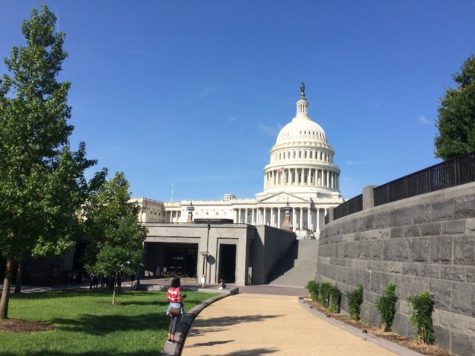An Exploration into Social Media
GRATEFUL USER Senior Isaiah Kim, a regular user of Snapchat and Facebook, values the networking possibilities made possible by social media. Kim says, however, that “sometimes people are going to try to bypass filters.”
May 4, 2018
It’s the one thing that connects and unites us. But does it improve us?
A couple weeks ago, I was in the auxiliary gym after school helping a friend carry around his stuff. And, standing there, I happened to overhear an interesting conversation. One of the adult supervisors, noticeably flabbergasted, was spouting about an issue that hit particularly close to home.
“Look at all these boys. Every one of them is looking at their phone. I don’t see a single kid off their phone. I know, I know. It’s not their fault they grew up in the age of social media, I mean, their lives practically revolve around it. But I wish people parents wouldn’t just give their kids this much freedom. I’m now more and more concerned about what we are letting these kids do. What are they doing on their phones right now?!”
“It’s Fortnite. A new game that everyone’s addicted to,” A girl replied. She was also on her phone, mid-conversation, probably a little too busy with Snapchat streaks to show any eye contact. (This isn’t my attempt at profiling, by the way. It’s merely a probability judgement).
For the record, I don’t condone eavesdropping, but I must admit that some of the best dialogues I’ve witnessed have been without invitation. That woman’s rant, if you will, though a little short-lived, spurred a radical change in attitude. I think our parents may be on to something. I think that social media, with its larger-than-life influence, and despite all the benefits it yields, presents some difficult problems. And those problems are trickling down to our youth.
Let’s take Snapchat as an example. It’s a great tool for communication, and an exceptional engine of innovation. But 13-year-olds, while certainly equipped for socialization, and equally deserving of a chance to explore, are not necessarily overflowing with self-esteem. To them, it’s a metric of popularity, and potentially, a vehicle for social mobility, in one way or the other. Developing meaningful relationships with peers? That takes a backseat to learning how to take selfies like a pro.
Parents, mostly befuddled by the addictiveness of social media applications like Snapchat, espouse different approaches to monitor their children. Sophomore Raul Hernandez says, “I connect with a lot of my good friends using social media. My mom does care about my phone usage, but she doesn’t bug me about it that much. I guess she wants me to be independent and learn from my own consequences.”
There are also those with more hesitant parents. Freshman Emily Palms says, “I use Snapchat quite a lot, but still not even close to some of the people I know. My mom finally allowed me to get it last October. Social media is good for opening our eyes, especially for current events. But I think parents should definitely regulate. I don’t think sixth graders are socially mature enough to handle something like Snapchat.”
At the very minimum, our parents are right about this: it can be distraction from academics. Teachers know all too much about the occasional poses students make mid-lecture, and not to mention the suspiciously synchronized nature of bathroom breaks nowadays.
It is a catalyst for procrastination as well, so to speak.
More importantly, though, it’s a convenient escape from real social interaction. An adrenaline-booster, as some would put it, designed to bring people together but only succeeding halfway. Call me uncultured, but I do not subscribe to the trending notion that friendships can be relegated to a streak. Yes, Snapchat is remarkably effective as a social network. But the network is partially built on superficial presentation, perhaps lacking in authentic sociability.
Just to be clear, the mission here is not to cherry pick the pitfalls of an entire industry, much less to insult its users. It is, however, an adamant concurrence with the aforementioned concerns raised by parents and teachers. Of course, as many would indicate, the benefits of social media are, indeed, quite compelling.
Senior Isaiah Kim says, “The main draw to social media is keeping in contact with people. Especially people that you don’t really see very often in life. Additionally, it’s a great way to stay updated on the news.” Palm says, “I’ve seen a lot of really cool things that social media allows us to do. Being in ASB class council, we use an Instagram account in an advertising aspect, as well as for student recognition. We direct message many students to fulfill our goals as class council.”
Junior Kunal Bhargava says, “Well, the three main social media platforms I kind of use the most are Snapchat, Instagram, and Facebook. I actually use Instagram a little more than the others, because I feel like it has a lot of entertaining and cool features. All of this is really quite useful, because you can always direct message your peers and classmates if you don’t have their contact info. Yes, I understand that there is concern about cyberbullying and people using fake accounts. People really need to be careful about that. But other than that, social media is really useful in our lives.”
I couldn’t agree more; to ignore the progress spurred by these technologies is to disregard history. The perspectives IHS students share are certainly meritable. Social networking has been sprawling for decades now, and in 2004, the rockets were launched.
Fourteen years ago, Mark Zuckerberg spearheaded an ambitious idea with many of his Harvard buddies from a dorm room. Of course, it’s Facebook. In doing so, the 20-year-old visionary opened up doors for people across the world, redrawing, in essence erasing, the boundaries of networking potential. What is Zuckerberg up to now? That’s a good bridge to the next point: Social media and politics.

TALL TASK Mark Zuckerberg, one of the wealthiest men on the planet, testified before Congress in early April. He was, quite expectedly, grilled by members of both parties.
While we were on Spring Break, the highly influential co-founder of Facebook found himself in unfriendly terrain: Capitol Hill, a muddled swamp of spirited Senators and razor-sharp representatives, all ready to pounce on the next target. So why was that target Zuckerberg? Well, Facebook is now ever-so-influential in the political sphere, and frequently viewed as a powerful instrument of modern campaigning. But, of course, there are some problems with online politics. There’s fake news, hate speech, and privacy infringement, just to list a few. And Facebook, as the de facto watchdog for the aforementioned no-nos, is now receiving a pounding for prior negligence, especially for their inactivity during the critical campaign season just two years ago.
Somehow, Facebook managed to tick off congressman from both sides of the aisle. Democrats are enraged, of course, as the 2016 thumping is still unfathomable for them. They claim to be problem solvers, but truthfully, they’re just looking for political points (and someone to blame). On the other hand, Republicans, eager to deflect from their legislative malaise, have something else to whine about. Namely, the censorship of conservative voices on media platforms. Perhaps the most zestful questions were of this nature. The firebrand conservative from Texas, also a uniquely articulate Harvard-educated lawyer, was relentless. Yes, I’m speaking of Ted Cruz.
“There are a great many Americans who I would say are deeply considered that Facebook and other tech companies are engaged in a pervasive pattern of bias and political censorship.”
“Does Facebook consider itself a neutral public forum?” Cruz asked Zuckerberg.
This segment alone tells the whole story, at least from the conservative angle. Social media companies play an increasingly crucial role in the dissemination of information. So, with big responsibility, there’s great burden, and certainly Zuckerberg knows this. To truly understand the impact of social media, look at the political landscape.
Kim says, “This whole ordeal is quite interesting. It’s actually amazing how many of our own lawmakers are greatly uninformed about the state of social media. It kind of makes sense though. They didn’t grow up with it, after all.”
The last point Kim raised is an important one. Of course, we were the first generation to grow up with this frenzy of social media innovation. And perhaps the word generation, which seems to connotes a stretch of several decades rather than a minute subset, is not the best word to use. Those born at the turn of the century represent the small cohort of individuals who witnessed the advent of Twitter and Snapchat as teenagers. But for most of us, teenage years are fading into merely memory status. Soon, we will work to become productive members of society. This expectation, however reasonable, has its fair share of ardent skeptics. To them, we’re a little too entitled to understand the work ethic are parents know. To them, we’re sensitive and stubborn, not determined and diligent. They point to social media as a convenient culprit. And this is the best part: so far, they’re right. At the very least, their contentions have not been proven wrong. So IHS, live freely, but with a purpose, and without dependence. Live with an unwavering angst to learn more, and be better. Most importantly, live to prove them wrong.


